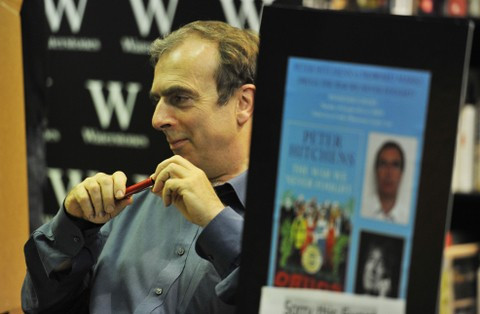The War We Never Fought, by Peter Hitchens: Review

Peter Hitchens book, The War We Never Fought: The British Establishment's Surrender to Drugs, is not what you might expect.
Readers familiar with Hitchens' stance on drugs may well be surprised to find that far from producing a 290 page rage against cannabis, Hitchens has actually provided a much more understated and interesting history of drugs in Britain.
Hitchens is quite open about the fact that neither he nor anyone else can prove that cannabis is (or isn't) a danger to mental health. Words like "could", "may be related" "possible that" feature very prominently in the early chapters.
Some will no doubt see this as a weakness, yet Hitchens himself points out that proof is almost impossible to come by partly because of constantly changing definitions of what constitutes mental illness. There is no objective test for psychosis or schizophrenia.
Proof being elusive, Hitchens piles anecdote upon anecdote (indeed a whole chapter is devoted to newspaper cuttings of crimes committed by people under the influence of cannabis) in a bid to show that cannabis is a far from harmless drug. No proof to be sure, but evidence certainly for those who want to see it.
Regardless of whether cannabis can be proven to be harmful or not, a large chunk of the book is devoted to disproving the notion that there is a fierce war on drugs, that this war has failed and that subsequently drugs (or at least cannabis) should be legalised.
Here Hitchens no longer has to rely on anecdotes but has facts, figures and dates aplenty. Covering ground from the 1971 Misuse of Drugs Act (and the Wootton Report which preceded it) right up to the more recent adventures of Brian Paddick in Brixton, Hitchens makes a convincing case that the anti-drug laws are not unenforceable as legalisers might claim, but unenforced.
In this the police themselves come in for a surprising amount of criticism not only for their failure to enforce the law but their apparent desire not to do so. It was the police rather than Parliament who introduced the near-meaningless device of a cannabis warning and it is the police who are, according to Hitchens, "one of the strongest lobbies for drug liberalisation in the country".
As well as covering the possible dangers of cannabis and chronicling the enforcement of drug laws in Britain, Hitchens takes on many of the arguments used by those who lobby for legalising cannabis and makes his own moral case against drug use.
Aldous Huxley and John Stuart Mill make their appearances here and pro-drugs arguments based on the legality of alcohol and tobacco are also dealt with. One apparent omission though is that Hitchens does not appear to take on the argument that keeping drugs illegal (even if in name only) fuels conflict and causes many deaths in countries such as Mexico.
The only possible reference I could find to this line of argument is not explicit and is made on page 14 where Hitchens says, "They [pro-drug legalisers] enjoy claiming that the supposed 'War' is cruel and had failed, despite being savagely waged. They go on to allege that this phantasmal 'War' is the cause of many evils and crimes."
On the same page he states "[Legalisation] it is argued, would break the connection between drugs and criminal gangs."
This may be a reference to the problems of Mexico, which when interviewed Hitchens states quite clearly are the fault of drug users in the west, "Everyone who takes these drugs is helping to kill poor people in Mexico and Columbia and they should be ashamed of it," but it is not explicit in the book and the cited passages could just as easily refer to evils, crimes and criminal gangs in Britain rather than their Latin American counterparts. Neither Mexico nor Columbia feature in the index.
Ah the index. Ever since he wrote The Broken Compass (later re-released as The Cameron Delusion) the index is the first thing one should turn to in a Peter Hitchens book.
Again there are some amusing entries in The War We Never Fought, my favourite being "Nuns, Maltese, pray over author as born" but it must be said that it's not as much fun as the index in The Broken Compass, which remains the gold standard of joke indexes.
Overall an interesting read, particularly when covering the political goings on between James Callaghan and the drug liberalisers in the Cabinet of the late 1960's and early '70s and a good counter to some of the lazy arguments put forward in favour of cannabis.
© Copyright IBTimes 2025. All rights reserved.





















